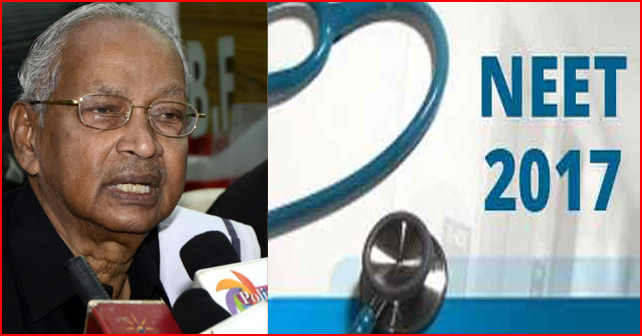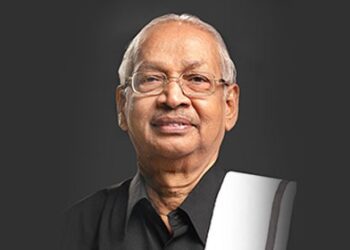Neither the Central Government Nor Medical Council of india has the power of instructing the states to conduct NEET
Dr.K.Veeramani
President, Dravidar Kazhagam
The following is the text of the statement issued by Dr.K.Veeramani, President, Dravidar Kazhagam, explaining neither the Central Government nor the Medical Council of India has the power to instruct the States to conduct the medical entrance test, NEET
The Medical Council of India Act 1956 was has been amended on 24th May 2016 in Parliament which said that it possesses power to instruct for the common entrance test for both the under graduate and post graduate courses in medical and dental colleges. The Amendment Act comprises of the insertion of new section 10-D and the addition of the provision of ‘mb’ in Sec.33.
This amendment mandates conduct of NEET (National Eligibility cum Entrance Test) for all the under graduate and post graduate medical and dental courses in the country. However, the Central Medical Institutions like AIIMS (All India Institute of Medical Sciences) and JIPMER (Jawaharlal Institute of Postgraduate Medical Education and Research) and Armed Force Medical College do not come under the purview of mandatory ‘NEET’. The ordinance promulgated for mandatory entrance test became an Amendment Act and that was published in the Government of India Gazette dated 5th August 2017.
Is the Amendment Act valid?
The Amendment brought to the Medical Council of India Act exceeds the law making power, Constitution conferred on Parliament. That suffers from the vice of legislative incompetency.
Had the intricacies of the limitation of legislative power been analysed in depth, parliament would not have passed this Amendment. The Central Government wrongly assumed the existence of power and has interfered in the exclusive legislative domain of States. It is not valid constitutionally. Had these points been put-forth in the apex court and been argued, there is every chance of Supreme Court deciding the Amendment Act invalid and the mandatory NEET would have become obsolete.
Universities are empowered exclusively!
Powers to decide on the regulations related to the admission of students and conducting examinations come under the exclusive domain of universities. Such powers of universities cannot be grabbed either by the Central Government, by the Medical Council of India or Dental Council of India. Such grabbing of powers of universities is not constitutionally permissible. The principles of interpretation of Constitutional Law can be put forth to expose the invalidity of the said Amendment Act.
As per the Constitution, the power to incorporate / establish and regulate a university is conferred on the respective States. It is the unique power of the universities to decide on how to admit the students and on what basis the examinations have to be conducted. It is the exclusive duty, right and power of universities.
Since the Central Government is not vested with the power to incorporate and regulate universities, it cannot enter into the domain of the universities.
It is the prerogative of every university to design and introduce degree courses and to decide the basic qualification for the admission of students for the courses offered by them. This exclusive authority can be exercised only by the respective Universities.
Power to legislate
The powers to pass a legislation are distributed by the THREE lists viz. Union List, State List and Concurrent List in VII Schedule of the Constitution. The second list i.e. State list comprises the governable areas wherein only the States can exercise its power. Under State list, Entry 32 proclaims the power of States thus:
“Incorporation, regulation and winding up of corporation other than those specified in List 1 and universities; unincorporated trading, literacy, scientific, religious and other societies and associations; co-operative societies.”
As per the above listed power, only the States have got power to incorporate, regulate and to wind up…. universities.
In the same VII Schedule, under Union list the exercisable powers of the Central Government are covered. Entry 44 says thus:
“Incorporation, regulation and winding up of corporations, whether trading or not with objects not confined to one state, but not including universities.”
The subject, ‘universities’ is specifically excluded in the Union List, with the words, not including universities.
The combined reading and analysis of both State list, Entry 32 and Union List, Entry 44, will make it evident, in clear cut terms, that the incorporation, regulation and winding up of …… universities are exclusively given to the States and only the respective State has got exclusive power to legislate for universities, coming under its purview.
All the above discussions relating to the power of States are applicable to all the States.
If any petition challenges the Amendment Act of Medical Council of India brought by the Central Government, in the court of law, and arguments are put forth on the validity of the said Amendment Act, that stipulate entrance tests for medical college admissions, it is definite that the challenge will succeed.
The reason for the confidence of prospective success is that the High Courts and the Supreme Court are bound to decide the challenge of the legal validity only by analyzing the Constitutional provisions. The above stand on this line will be helpful to all the States to oppose ‘NEET’ being implemented mandatorily in those States.
NEET has been imposed on the States, exceeding the powers conferred on the imposing authority as per the Constitution. This aspect has to be argued from many angles while challenging the NEET in the Court of law.
NEET, irrelevant to the State of Tamil Nadu
The position of Tamil Nadu is entirely different from other States. Whatever be the stand on the other states, the NEET as proposed by MCI is not at all applicable to the State of Tamil Nadu.
In 2007, during the DMK Government, headed by Kalaignar M. Karunanidhi in Tamil Nadu, an Act was passed in the State Legislative Assembly for the abolition of entrance tests to all professional degree courses including medical and dental courses. The Act also got the assent of President of India, which makes the Act equivalent to the Acts legislated in Parliament of India.
The 2016 MCI Amendment Act does not make NEET compulsory for admission to the medical courses. It is only the Notification issued by MCI makes the NEET mandatory. The Medical Council of India has no such power. Besides, the Parliamentary Standing Committee on Health and Family Welfare in its 92nd Report on ‘The Functioning of Medical Council of India’ has stated the following:
“The Committee also recommends that introduction of CMET (Common Medical Entrance Test) should be done across the nation barring those States who wish to remain outside the ambit of the CMET.”
(Report: Paragraph 5.26)
The discussed points highlight that neither the Central Government nor the Medical Council of India has power to impose any entrance test like NEET on the universities, coming under the purview of States. Besides the States have got every right to seek exemption from NEET and they cannot be compelled to conduct NEET.
Both the Central Government and the Medical Council of India have imposed entrance test, NEET on States, when they have no such power at all.
Tamil Nadu has taken a policy decision not to conduct entrance tests to all the professional courses and legislated an exclusive Act in the State Assembly. It is also significant to note that the Act got the assent of the President of India. This Act has been in force for the past NINE years in the State. The strength of the Act is equivalent to Parliamentary Act and it cannot be curtailed by any authority.
The inserted section, 10D in the Medical Council of India (Amendment) Act 2016, is contrary to the provisions of Tamil Nadu Dr. M.G.R. Medical University under whose purview most of the medical colleges (the State controlled / private) come.
Tamil Nadu Dr. M.G.R. Medical University Act was legislated by the Tamil Nadu State Legislature as per the power conferred on the State under Entry 32, List II (State List) of the Constitution. Such powers are not available with the Central Government, because Central Government cannot regulate universities.
Waging a valiant legal War!
The inserted section 10D of the Medical Council of India says thus :
“There shall be conducted a uniform entrance examination to all medical educational institutions at the undergraduate level and post-graduate level through such designated authority in Hindi, English and such other languages and in such manner as may be prescribed and the designated authority shall ensure the conduct of uniform entrance examination in the aforesaid manner:”
Passing NEET is not made a pre-requisite for admission to Medical Courses by this section.
Admission of candidates in the affiliated colleges of Tamil Nadu Dr. M.G.R. University is governed by its own Act. Neither the Central Government nor the Medical Council of India has power to control it.
Further, NEET has been imposed on the States, exceeding the powers conferred on the imposing authority as per the Constitution. This aspect has to be argued from many angles while challenging the NEET in the Court of law.
It is the urgent duty of any individual or organization having identical views against NEET, to challenge it in the Court of law.
States are conferred with the power through the Constitution to regulate the functioning of universities under its purview through the legislations enacted by it and for it. Seeking exemption from NEET, i.e. avoiding interference in the powers of States, does not amount to seeking charity. It amounts to claiming the rights of the States.
It is the duty of all the States especially the Tamil Nadu State Government to wage a valiant (legal) war against imposition of NEET in the Court of Law.
The delay of an academic year, has already occurred. Better late than Never! The State Government of Tamil Nadu must come forward and act fast!
NEET VALIDITY?
Letter sent to the editor -The Hindu
This has reference to the statement made by Thiru.K.Veeramani, President of Dravidar Kazhagam, published in The Hindu – 24th October 2017. Every person having legal knowledge will, definitely, endorse his views in full . He has rightly pointed out that provision of the Indian Medical Council (Amendment) Act 2016 enabling MC1 to conduct NEET, is exceeding the law making powers of Parliament. One reported case in St. Xaviers College, Ahamedabad Vs State of Gujarat (AIR 1974 SC 1389 Paras 94, 177-179-271) it was held that a university has powers to maintain the requisite educational standard and efficiency, for example as to ‘qualifications for entry of students”. So it is very clear that university alone is the competent authority to fix the qualifications for entry of students. Further when an Act was passed in Tamil Nadu in the year 2007 abolishing the entrance test to all professional degree courses, MC1 Act prescribing NEET is not a law at all, but is a mere pretence of law and the courts will not take notice of such a law. It is nothing but a fraud on the constitution. This view has been expressed in a reported case “S.S.Bala Vs B.D. Sardana (1997) 8CCL 522 (Paras 133 and 153 P & Q)
Therefore, Thiru. K. Veeramani. D.K. President throws light on the above subject in proper time and in proper way and legal elites have to salute him.
P. Natarajan
District Judge (Retired)
Madurai






